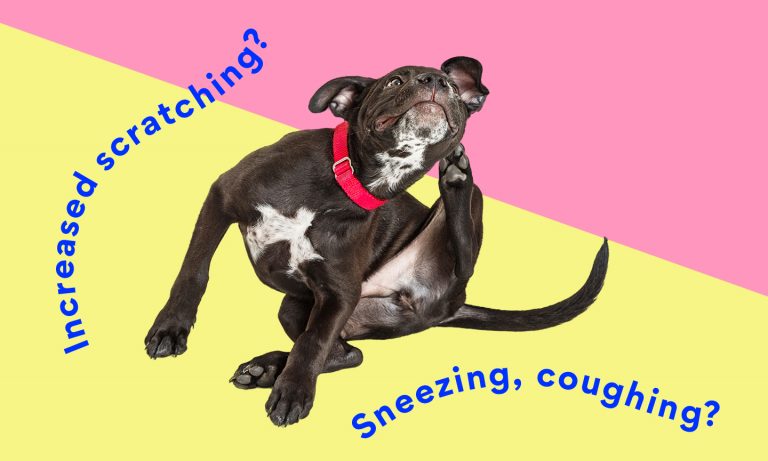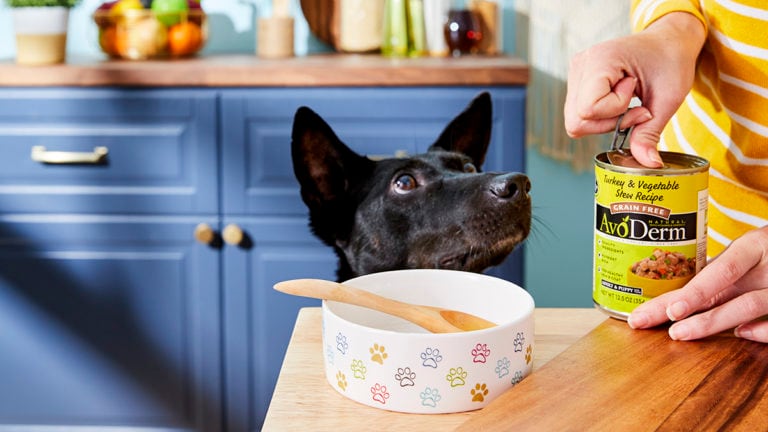What Causes an Itchy Dog?
Allergies are one of the most common reasons for dog scratching. Like humans, dogs can be allergic to many things, from their food to things in the environment—including fleas.
In the case of flea allergy dermatitis, it’s not the fleas themselves that animals are allergic to, but to the flea saliva, says Dr. Martin Goldstein, DVM, an integrative veterinarian and owner of Smith Ridge Veterinary Center in South Salem, New York.
Itchiness also can be caused by a mite infestation or a skin infection called pyoderma, in which case the dogs are only itchy because of the infection and can become allergic to the bacteria itself, Goldstein says.
"I have seen cases from very mild and uncomplicated skin issues—mild skin infection, early noticeable hair loss—to serious and complicated patients where they are coming in and the dog has raw skin lesions," says Dr. Loke Jin Wong, DVM, an associate veterinarian at Pikesville Animal Hospital in Pittsburgh, Pennsylvania.
Finding the Underlying Causes
Before you can work on the actual itching, your vet must pinpoint what’s causing it.
“Until the underlying cause is addressed, the itchiness will never go away,” Dr. Wong says.
Veterinarians can determine the causes of an itchy dog, whether it’s dog food allergies, dog skin problems or something else.
“Additionally, a lot of our itchy dog patients come in with secondary bacterial and yeast skin infections,” Dr. Wong says. “You can treat these secondary infections, but they will keep coming back until the primary underlying cause is resolved.”
A good checkup for dog skin problems should include a thorough exam.
“Veterinarians can recommend appropriate diagnostics, which could include procedures such as scraping the skin of a dog to check for mites, pressing a microscope slide on a dog’s skin to get impression smears, medication and diet trials,” Dr. Wong says.
Depending on the results, your itchy dog might need a change in diet, antibiotics, allergy medication or another treatment to resolve the issue.
How to Help Your Itchy Dog
While you wait for antibiotics or other medications to take effect, there are things you can do to provide itch relief for dogs.
For dogs with flea allergy dermatitis, for example, over-the-counter medications include topically applied wipes and shampoos, and omega-3 fatty acids, which can help with promoting skin health (but not with treating flea allergy dermatitis).
Add Fatty Acids to Your Dog's Diet
Dr. Wong says to start by adding fatty acids to your pup’s diet.
“Fish oil and flaxseed oil are usually good dog supplements to give our furry friends, but please consult with your vet for an appropriate product and dose,” Dr. Wong says. “There are also some topical fatty acid products out there that could potentially be applied to these itchy spots.”
Try Topical Products
Dr. Goldstein says to look into topical products containing arnica, calendula and aloe vera. Before applying anything to your dog’s skin, however, make sure there are no open wounds. Otherwise your dog can end up with burning or discomfort.
“I always recommend that people have an aloe plant in their homes to serve as a fresh source,” Dr. Goldstein says. “Supplements containing the natural sterol called beta-sitosterol are also very anti-inflammatory with no side effects.”
The most commonly used medication to ease canine itchiness is cortisone, either by injection, orally or in the form of creams, Dr. Goldstein says.
“This is only when the condition is more severe and the pet is truly suffering,” he says.
Some pets might benefit from antihistamines, but only under the guidance of a qualified veterinarian.
Use Anti-Itch Shampoos or Soothing Wipes
You also can use a dog shampoo for itchy skin, like Vetoquinol’s Aloe and Oatmeal shampoo to soothe their skin, or try TropiClean’s Allergy Relief Wipes to relieve your pup.
Whatever you use, Dr. Wong says to talk with your vet first.
“We usually don’t recommend [over-the-counter] medicating until we are able to work up the underlying cause,” Dr. Wong says. “A lot of times, treating certain lesions with steroidal creams or other medications could alter the disease process and make it harder to diagnose.”
Prevent Your Dog from Accessing the Area
As you properly deal with the underlying cause, your dog’s itchiness eventually should be resolved, Dr. Wong says.
“In the meantime, an Elizabethan collar is the way to go,” she says. “A T-shirt is also not a bad idea if your pet does not tolerate the e-collar well.”
All Four Paws' e-collar comes in several sizes and is a soft, cone-shaped Elizabethan collar instead of the ridged plastic cones often seen.
For small dogs, you can use a baby or toddler onesie. A comfy wrap or bandage around the itchy area also might work.
More on helping your itchy dog:
Share:












